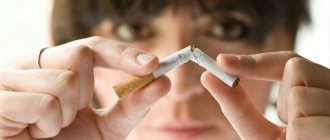First you need to decide on what we call bad habits. In modern society, only something frankly destructive is considered bad habits: alcohol, smoking, drugs, and most often only in their completely asocial forms. And those who are independent of heavy intoxicants are sincerely in the illusion that they are free, independent and no harmful passion controls them. In this case, I am forced to destroy a certain “porcelain” illusion: almost everyone has bad habits.
For children and teenagers: What are bad habits and how to get rid of them?
Children and teenagers are the main group of people who have several bad habits. According to statistics and research, 75% of children are susceptible to performing certain negative actions.
Read also:
List of daily habits that will improve your quality of life | Based on my own experience
It is easier to get rid of bad habits at a young age, since they have not yet become a full-fledged part of the personality. The following habits are identified that appear in childhood and adolescence:
- Nail biting;
- Picking your nose or ears;
- Loud chewing of food (chomping);
- Chewing on pens and pencils.
It is necessary to get rid of them, since these habits reduce the attractiveness of a teenager, betray bad manners and negatively affect the appearance.
Don't lose your resolve
We all make mistakes, we all fall from time to time. If this happens to you, don't beat yourself up too much. Moreover, get ready for falls, because it is inevitable.
Every day by working on yourself, you become better. If you stumble and stop dieting, give up gymnastics or mindfulness practice, everything that you have achieved so far will not be lost. All the skills you learned are still in your brain to help you get back in the saddle.
Don't stop and don't give up. If you are reading these lines, you can definitely become who you want to see yourself. Believe in yourself!
Based on the book “The Psychology of Bad Habits”
#1: Nail biting
This effect is observed in 85% of children and adolescents. Timely awareness of the problem will help you overcome the habit quickly and without emotional stress.
Reasons for appearance
In 90% of cases, nail biting is associated with emotional and physical overload, as well as stress. This is a kind of response to the changes that have occurred in life.
According to statistics, children begin to bite their nails the moment their daily routine or environment changes. For example, the beginning of the school year.
Why should you stop biting your nails?
Nail biting causes mechanical damage to the nail plate and makes it weaker. Visually, nails become unkempt and lose their natural shade. Communication with other people becomes difficult as many people do not like to watch such action.
Consequences of nail biting
What's stopping you from getting rid of it?
The main problem is that the child does not understand that he is faced with a problem. In this way he relieves tension, so he does not want to fight the habit on his own.
Effective ways and methods for getting rid of
For children, the best way to get rid of nail biting is attention from their parents. They must find an activity that will distract the child at the moment when he wants to put his fingers in his mouth.
A modern way is to coat your nails with a special compound that has a distinct bitter taste. By repeating the action several times, the consciousness receives a negative emotion. As a result, the habit disappears. Another fun way is to wear a mask at home, relevant in 2021.
Teenagers can come to an understanding of the problem on their own, but they will need emotional help and support from family.
What changes await after defeating a bad habit?
- Calm;
- Nails will regain their healthy appearance, stop peeling and become stronger;
- Teenage girls will have the opportunity to have an attractive manicure that will become part of their image.
Consciously examine your troubles
Here's how Charles Duhigg talks about his bad habit. Every day after lunch he went to buy cookies at a cafe near work. He realized the problem when he began to develop fatty folds.
Why is he doing this? Because he thinks it's good? Or is his body craving glucose because it’s already lunchtime and he’s hungry? Or is there another reason?
Charles realized that the real reason he left his office for cookies was to take a short break from work and socialize with his colleagues. This was his real reward.
Dig deeper to find the real gain, the true motive behind your habit.
The rewards can be many. But among them there is always one most important. It is precisely this that we should try to satisfy by replacing the corresponding actions with healthier ones.
It's helpful to create a physical reminder for yourself why you're trying to break a particular habit.
Let's say you're struggling with a product addiction that results in acne on your face. You can retouch your portrait by removing traces of rashes to achieve a picture of your ideal future self. And then place this image where you will see it most often. For example, on a phone screensaver. This way you will get used to a positive image of yourself.
Every time you reach for a problematic product, look at this photo and strengthen the thought in your mind: “By giving in to temptation, I am moving away from this wonderful future.” It helps. But no one says that resisting your desires is easy.
#2: Picking your nose or ears
It is recorded in 50% of children and 20% of adolescents. The difference is due to the emergence of a certain self-control due to age.
Reasons for appearance
Habit is associated with genetic memory. Children become familiar with the characteristics of the body by removing dried mucus from the nasal cavity. At this time, they relax and begin to think or dream about something.
The habit is also a manifestation of attention deficit disorder (ADD). As people age, the habit may persist if a person feels lonely or cannot concentrate on one thing.
Why should you stop picking your nose and ears?
You should get rid of nose picking in order to maintain the health of the mucous membrane. During such actions, delicate tissues can easily be damaged. As a result, a wound will appear in the nose, which will cause discomfort.
Another reason for getting rid of it is poor aesthetics. People around you will not want to communicate with you and be friends. There will be new reasons for ridicule.
What's stopping you from getting rid of it?
The barrier to deliverance is self-doubt and fear. Subconsciously, a child or teenager finds protection at the moment when the process of picking their nose or ears occurs. He forgets about the problems, but after completing the process they reappear in his thoughts, which forces him to return to the habit again and again.
Read also:
50 tips for teenagers that will help them in the future
Effective ways and methods for getting rid of
The main recommendation is to find an interesting activity that will distract and relax. In the case of kids, playing with parents is the best way. There are many hobbies for teenagers - drawing, modeling, programming. Doing fine work with your hands (embroidery, knitting, assembling a mosaic) will help distract you.
Interesting sites for finding hobbies:
- Vikium
- Puzzle English
- Foxford
- Tetrika-school
What changes await after defeating a bad habit?
- The main change is self-confidence;
- The child will have a new hobby;
- The fear that someone will see you picking your nose or ears will disappear;
- The excessive load on the nervous system will disappear;
- They will want to communicate with you, since there will be no reason for ridicule.
A reward system that makes you feel guilty
When you realize that you have done something good, you can sometimes reward yourself with something harmful because you “behaved well.” From this series - fast food after a workout, browsing unnecessary sites during the working day, buying all sorts of rubbish.
Why do you often feel wrong and guilty after giving in to your immediate desires? And why do you do it again, even when you are perfectly aware of everything?
Because your brain's reward system isn't always your friend—and sometimes it leads you in the wrong direction.
No. 3. Loud chewing of food (chomping)
This problem is present in 55% of children and adolescents. For some, it goes away on its own, without special intervention from adults. You just need to point out that such behavior is ugly, especially in society.
Reasons for appearance
In childhood, slurping is a consequence of lack of education (in 90% of cases). For teenagers, such an action is an expression of protest. In this way they express their disagreement, because they understand that slurping does not correspond to generally accepted behavior.
Why should you stop slurping?
Indecent behavior at the table will cause additional disagreements between children and adults. There will be reasons for raised voices and new prohibitions. People around you will also not want to communicate with a person who does not know how to behave calmly at the table.
Some parents may prohibit their children from being friends with a child who chews food loudly or slurps. They will think that this way their children will also develop a bad habit.
Effective ways and methods for getting rid of
For a child or teenager, a simple desire to get rid of slurping is not enough. Motivation must be clear and understandable. An effective technique is to imitate your favorite hero, a famous person who demonstrates correct behavior at the table while eating.
What changes await after defeating a bad habit?
- Normal relationships with others;
- The likelihood of conflict situations in the family will decrease;
- Misunderstandings and ridicule from friends will disappear;
- You will feel confident and able to overcome any difficulty.
Dopamine - the eternal promise of happiness
Seeing or feeling what you want is enough to activate the reward system in the brain. At this moment, it sends you dopamine, a neurotransmitter that controls attention, motivation and action.
The system is turned on by something that is associated with the promise of happiness for you: a 70% discount in a shopping center, the smell of a burger, a beautiful girl who smiled at you.
When dopamine is released, the triggered object instantly becomes highly desirable, even if it goes against your long-term interests.
That is why you get involved in actions that are impossible to resist at first glance, and then you are overcome with a feeling of guilt and disappointment in yourself.
No. 4. Chew pens and pencils
Repetitive action occurs in 90% of cases in the younger generation aged 6-8 years.
Reasons for appearance
The fact is that during school time the child experiences a sharp change in daily routine and responsibilities, resulting in the first serious stress. The process of chewing pens allows you to cope with the problem, distracting you from difficulties.
Why should you stop chewing your pens?
The main reason is to reduce the likelihood of oral injury. Chewing on a pen can negatively affect your dental health. And abandoning it will keep the handles visually attractive.
Effective ways and methods for getting rid of
Eating a nutritious diet will reduce the desire to chew on pens or pencils. The way your body works will help you overcome this bad habit.
Another technique is replacement. When the urge arises to put an object in your mouth, it is better to replace it with cookies, crackers or candy.
What changes await after defeating a bad habit?
- Maintaining an attractive appearance of office supplies;
- Pens can be borrowed without embarrassment;
- And also give to friends.
Read also:
4 main areas for improving adolescent health
Causes of bad habits
Traditionally, causes are divided into psychological and physiological.
The most common psychological reasons:
- Boredom. This is the catalyst for most bad habits. In order to entertain himself with at least something, a person is ready for the most useless actions, the main thing is that they do not require physical and mental effort and are always available.
- Aimlessness. If a person has low activity and lack of motivation, bad habits are all that remains.
- Stress. Constant tension requires rest, and the simplest thing you can do is smoke, wander aimlessly on the Internet, lose yourself in a video game, buy an unnecessary thing.
How to work through your anxiety and improve your quality of life - read on the website
- Social coherence. If a particular habit is considered the norm in society, with a high degree of probability everyone will follow it. Sometimes this is necessary to join the team, sometimes simply because everyone around is doing it.
- Pleasure. When pleasure becomes a habit, it develops into a painful thirst. A person may not notice how a basically harmless piece of cake (pleasure) can become a regular and harmful action.
The most common physiological reasons:
- Failure of the targeted action control system. The greater the activity of the orbifrontal cortex, the more purposeful a person’s actions, the less its activity, the more aimless actions a person performs.
- Weakness of the self-control model.
- The desire to conserve energy. The more often an action is repeated, the less conscious it becomes, therefore, the less energy needs to be spent on it.
- A way to get a “dose” of dopamine. Dopamine itself is not a happiness hormone, but simply put, it encourages a person to want something that they can get pleasure from. The only problem is that he cannot “decipher” how beneficial or harmful an action will be for a person in the long term.
Happiness hormones - what they are and how to help your body produce them - read on the website
For adults: What are bad habits and how to get rid of them?
Among adults there are also many people who have harmful habits. Mostly they come from childhood.
In adulthood, a person experiences more serious moral, mental, physical and emotional overloads. Not everyone can cope with them on their own. This is why bad habits arise.
The main ones:
- Overeating (poor nutrition)
- Drinking alcoholic beverages
- Smoking
Important! The use of prohibited substances and drugs is not a bad habit, but a disease that needs to be treated in specialized clinics.
No. 1. Overeating
According to statistics, 50% of people have problems with poor nutrition. Some can see and realize the problem in time, but about a third become slaves to food.
The desire to “eat stress” is a real problem that needs to be eliminated in order to maintain health.
Reasons for appearance
Stressful situations and frequent experiences – in 90% of cases they lead to a subconscious desire to eat.
Problems in the family, difficulties at work, quarrels with loved ones also become a reason for another chocolate bar or pizza.
Why is it worth getting rid of overeating?
Maintaining health is the main reason for refusal.
You also need to normalize your diet in order to get your figure in order and feel a surge of strength and energy. The positive emotions that will visit a person during this period will help him cope with any difficulties and problems.
What's stopping you from getting rid of it?
The hindrance is self-pity and reluctance to recognize the existence of a problem. A person cannot properly motivate himself and is afraid of difficulties that may arise on the way to overcoming the problem.
Effective ways and methods for getting rid of
It is important to make an independent decision that you need to get rid of overeating. Motivation is the next step on the path to victory. It can be different for everyone - a certain number of kg on the scale, the desire to become better and more attractive than others, etc.
You need to replace harmful foods with the right ones and create a balanced menu. In order not to break down, you can keep your own online diary . If a person knows that people look up to him, this will give him moral and physical strength.
If you are too lazy to prepare healthy food yourself, then home delivery services will always come to the rescue. Here is a list of the best of those who specialize in healthy food:
- Level kitchen
- BeFit
- General Food
- Lactomin.ru
What changes await after defeating a bad habit?
- You will feel better.
- Your weight and figure parameters will change.
- The right menu will be positive for the structure of nails and hair.
- Your overall perception of yourself will become positive, which will help you move forward and achieve success in all your endeavors.
Stopping an Old Habit
[…]
The action can be stopped by adjusting any of the three components of the Behavior Model: reducing motivation or ability, or removing the prompt.
If you manage to change any of these for a long time, the habit will stop. Sounds simple?
Yes and no.
Most people find it easy to give up the “uphill” habit of morning exercise or getting up at five in the morning. But these are not habits you want to get rid of. You want to stop the “downhill” behaviors that are getting in the way of your healthy, happy life.
Set yourself a specific goal to stop the habit.
When it comes to breaking a bad habit, people often mistakenly motivate themselves with abstract ideas, such as stopping being stressed at work or stopping eating junk food. It just seems to you that both of these goals are specific. They are actually abstract labels for obscure habits; I call them Generalized Habits. By focusing on a Generalized Habit, you are unlikely to get very far and unravel the knot in one fell swoop.
To move forward, you need to untie the loops individually, that is, find specific habits and engage in them. The Action Swarm will help you with this.
Write down in the cloud the Generalized habit that you want to get rid of.
The rectangles around the cloud contain the specific actions that make up the Generalized Habit. I will take the habit of eating junk food as an example.
No. 2. Drinking alcoholic beverages
Up to 30% of the adult population faces the problem. In most cases, alcohol use develops under the influence of negative circumstances.
Reasons for appearance
The desire to drink alcoholic beverages arises after long-term psychological problems. If a person is in a situation that seems hopeless, then alcohol helps him relieve stress.
Relaxing after work, avoiding problems in the family or difficulties in communicating with other people are all good reasons to drink.
Why should you quit alcohol?
Alcohol does not help solve the problem, but only allows you to forget for a while. All achieved successes will decrease and regression will occur over time - dismissal from work, problems with relatives, decrease in financial wealth.
What's stopping you from getting rid of it?
Fear of difficulty prevents you from taking the first step towards getting rid of a bad habit.
Lack of self-confidence, insufficient support from others, and psychological weakness are also obstacles.
Effective ways and methods for getting rid of
Immersion in work (preferably physical) and hobbies are an effective substitute for alcohol. Playing sports and hobbies will help you forget about the negative, and will also not leave time for sadness or self-pity.
What changes await after defeating a bad habit?
- Improved health and stamina;
- Positive changes in appearance;
- Success at work;
- You will always remember and be aware of your actions.
No. 3. Smoking
Smoking can appear in weak people who are easily influenced by others and who want to “be like everyone else.”
Reasons for appearance
Stress, worries, overexertion, psychological trauma or the desire to join a new team lead to the appearance of this negative habit. Primary relaxation will affect health problems in the future, which most people try not to think about.
Why should you quit smoking?
The consequences of smoking are deterioration of health. Financial costs will also increase, and the personal or family budget will suffer significant losses. A persistent and unpleasant smell of low-quality tobacco will appear in your apartment or car.
What's stopping you from getting rid of it?
Fear of not being able to cope with the problem, lack of confidence in oneself and one’s own strengths. The inability to find a replacement for the usual action can also become a hindrance.
Effective ways and methods for getting rid of
You can find a hobby or play sports. If this does not help, it is best to use special medications.
The main thing is to independently recognize the existence of a problem and motivate yourself to solve it.
What changes await after defeating a bad habit?
- Strength and self-confidence will appear;
- The good mood will return;
- The condition of hair and nails will improve;
- The appearance will become attractive to others;
- The stress from the constant desire to smoke a cigarette will disappear;
- The unpleasant smell will disappear.
Examples of physical and psychological habits
There are many examples of bad habits besides smoking, overeating and alcoholism. For example, discussing someone else's life, grumbling, shopping for no reason. There are addictions characteristic of a certain gender: diets, shopaholism - for women; gambling, recklessness on the road - for men. Below are the most common bad habits.
Smoking
Like many addicted individuals, smokers are confident that health problems will not affect them. But for every bad habit, sooner or later you have to pay.
According to statistics, people who inhale cigarette smoke cause irreparable damage to their lungs and blood vessels. They fall into the following risk groups:
- oncological diseases - 90%;
- acute bronchitis - 74%;
- coronary heart disease - 26%.
Women who smoke have a chance of remaining infertile for the rest of their lives.
Today there is an alternative to cigarettes - electronic nicotine substitutes. In essence, this is the same physical and psychological addiction, but it is believed that the consequences of smoking electronic cigarettes are less depressing
Alcohol addiction
Under the influence of alcohol, all human life systems collapse - from the nervous system to the cardiovascular system. Regular drinking of weak or strong alcoholic drinks is fraught with:
- depression;
- muscle weakness;
- blood clots in blood vessels;
- development of diabetes mellitus;
- drying out of the brain;
- enlarged liver;
- kidney problems;
- stomach ulcer;
- impotence.
Even minimal alcohol consumption for a week or more reduces a person’s intellectual functions.
Drug addiction
This is perhaps the most harmful and unacceptable bad habit that leads to physical and mental disorders faster than others. Narcotics are poisons that slowly destroy the human psyche and brain. With regular drug use, a person ceases to sensibly assess what is happening even when he is not in a state of drug intoxication.
Binge eating
This is a mental disorder that is associated with the fact that a person consumes an excessively large amount of food without controlling the process. This leads not only to excess weight, but also to serious illnesses. Most often, overeating develops against the background of constant stress or a difficult situation experienced.
TV addiction
Aimlessly switching channels, watching TV shows from morning to evening - someone might say that there is nothing harmful in this. But that's not true. In addition to general degradation, a person with television addiction leads a sedentary lifestyle, is usually overweight, and has poor eyesight.
Internet addiction
Almost the same as with television addiction. Mental subordination and the desire to constantly be online does not leave time for a normal lifestyle.
How to get rid of Internet addiction - read on the website
Habit of biting nails
A psychological habit, a reason, is the only “way out” of relieving stress and tension. It causes not only various infectious diseases, but also hostility from others.
Technomania
This bad habit can lead to depression and even mental disorders. It is expressed in the desire to constantly purchase phones, computers, and gadgets.
The habit of worrying about trifles
In principle, worrying and worrying is normal for a living person. However, background anxiety over trifles is a direct path to neuroses and somatic diseases. The best way to combat chronic anxiety is cognitive behavioral therapy exercises, which are also suitable for independent work.
Useful habits for every day that replace bad ones
There are at least 30 useful things that you can do every day in your everyday life:
- Smile in the morning
- Exercise and fitness
- Walk in the park
- Plant care
- Reading books and magazines
- Knitting
- Bead weaving
- Embroidery
- Assembling the mosaic
- Cooking
- Sports and active recreation
- Hardening
- Studying new knowledge (computer technology, cosmetology)
- Performing breathing exercises and exercises to strengthen vision
- Yoga
- Keeping a diary (you can start an online blog)
- Analysis of the day
- Conversations and communication with family
- Walking alone
- Making a plan for the next day
- Taking a bath, contrast shower
- Listening to your favorite music
- Intellectual training
- Board games
- Cleaning of the apartment
- Voicing positive things that happened during the day
- Small purchases
- Making things and objects
- Animal care
- Creating Collections
Positive emotions will replace all negativity.











